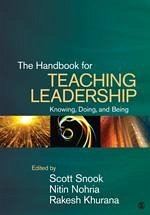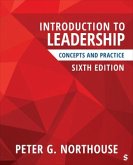The Handbook for Teaching Leadership
Knowing, Doing, and Being
Herausgeber: Snook, Scott A; Khurana, Rakesh; Nohria, Nitin N
The Handbook for Teaching Leadership
Knowing, Doing, and Being
Herausgeber: Snook, Scott A; Khurana, Rakesh; Nohria, Nitin N
- Gebundenes Buch
- Merkliste
- Auf die Merkliste
- Bewerten Bewerten
- Teilen
- Produkt teilen
- Produkterinnerung
- Produkterinnerung
Bringing together leading international scholars across disciplines for the dual purpose of chronicling the current state of leadership education and establishing a solid foundation upon which to grow the field, the text explores approaches to teaching leadership, the conceptual, theoretical and disciplinary roots upon which these approaches are based and what are the inherent strengths and weaknesses of each approach. The Handbook will be an invaluable resource to individuals, centers, institutes, and libraries to support the growing demand for courses in leadership and ensure that such…mehr
Andere Kunden interessierten sich auch für
![Introduction to Leadership Introduction to Leadership]() Peter G NorthouseIntroduction to Leadership138,99 €
Peter G NorthouseIntroduction to Leadership138,99 €![Researching Power, Elites and Leadership Researching Power, Elites and Leadership]() Christopher WilliamsResearching Power, Elites and Leadership235,99 €
Christopher WilliamsResearching Power, Elites and Leadership235,99 €![A Pluralistic Approach to Leadership A Pluralistic Approach to Leadership]() Nathan W HarterA Pluralistic Approach to Leadership198,99 €
Nathan W HarterA Pluralistic Approach to Leadership198,99 €![People Management Skills in Practice People Management Skills in Practice]() People Management Skills in Practice198,99 €
People Management Skills in Practice198,99 €![Exaggerated Claims? Exaggerated Claims?]() David WalkerExaggerated Claims?86,99 €
David WalkerExaggerated Claims?86,99 €![The Sage Handbook of Interpersonal Communication The Sage Handbook of Interpersonal Communication]() The Sage Handbook of Interpersonal Communication224,99 €
The Sage Handbook of Interpersonal Communication224,99 €![The SAGE Handbook of Media Studies The SAGE Handbook of Media Studies]() John D. H. DowningThe SAGE Handbook of Media Studies187,99 €
John D. H. DowningThe SAGE Handbook of Media Studies187,99 €-
-
-
Bringing together leading international scholars across disciplines for the dual purpose of chronicling the current state of leadership education and establishing a solid foundation upon which to grow the field, the text explores approaches to teaching leadership, the conceptual, theoretical and disciplinary roots upon which these approaches are based and what are the inherent strengths and weaknesses of each approach. The Handbook will be an invaluable resource to individuals, centers, institutes, and libraries to support the growing demand for courses in leadership and ensure that such courses and instruction are developed with multiple considerations and best practices in mind.
Hinweis: Dieser Artikel kann nur an eine deutsche Lieferadresse ausgeliefert werden.
Hinweis: Dieser Artikel kann nur an eine deutsche Lieferadresse ausgeliefert werden.
Produktdetails
- Produktdetails
- Verlag: Sage Publications
- Seitenzahl: 600
- Erscheinungstermin: 21. September 2011
- Englisch
- Abmessung: 261mm x 182mm x 35mm
- Gewicht: 1157g
- ISBN-13: 9781412990943
- ISBN-10: 1412990947
- Artikelnr.: 33926985
- Herstellerkennzeichnung
- Libri GmbH
- Europaallee 1
- 36244 Bad Hersfeld
- gpsr@libri.de
- Verlag: Sage Publications
- Seitenzahl: 600
- Erscheinungstermin: 21. September 2011
- Englisch
- Abmessung: 261mm x 182mm x 35mm
- Gewicht: 1157g
- ISBN-13: 9781412990943
- ISBN-10: 1412990947
- Artikelnr.: 33926985
- Herstellerkennzeichnung
- Libri GmbH
- Europaallee 1
- 36244 Bad Hersfeld
- gpsr@libri.de
Dr. Snook is currently an Associate Professor of Organizational Behavior and Tukman Faculty Fellow at the Harvard Business School. He graduated with honors from West Point earning the Royal Society of Arts Award for the most outstanding overall cadet in his class. Following graduation, he was commissioned in the US Army Corps of Engineers where he served with distinction in various command and staff positions for over 22 years, earning the rank of Colonel before retiring in 2002. He has led soldiers in combat. Among his military decorations are the Legion of Merit, Bronze Star, Purple Heart, and Master Parachutist badge. He has an MBA from the Harvard Business School, where he graduated with High Distinction as a Baker Scholar. Dr. Snook earned his Ph.D. from Harvard University in Organizational Behavior winning the Sage-Louis Pondy Best Dissertation Award from the Academy of Management for his study of the Friendly Fire Shootdown in Northern Iraq. Until July of 2002, Colonel Snook served as an Academy Professor in the Behavioral Sciences and Leadership Department at the United States Military Academy. He also directed West Point's Center for Leadership and Organizations Research as well as its joint Master's Program in Leader Development. He is the primary author of West Point's Cadet Leader Development System--the Academy's philosophy on how to develop leaders of character for the Nation. Professor Snook's book Friendly Fire was selected by the Academy of Management to receive the 2002 Terry Award as the most influential book on managerial thinking published during the past two years. He has also co-authored a book that explores the role of "common sense" in leadership titled, Practical Intelligence in Everyday Life, available from Cambridge University Press (2000). Professor Snook has shared his leadership insights in formal executive education programs at Harvard and with numerous corporate audiences around the world. Professor Snook′s research and consulting activities have been in the areas of leadership, leader development, change management, organizational systems and failure, and culture. He currently lives in Concord, Massachusetts with his wife Kathleen and their five children. Dr. Nitin Nohria is the Richard P. Chapman Professor of Business Administration. His research centers on human motivation, leadership, and corporate transformation and sustainable performance. Co-author of more than ten books, his most recent, Paths to Power: How Insiders and Outsiders Shaped American Business Leadership, chronicles how leaders from different backgrounds rose to power in American business. This is a companion book to In Their Time, which draws lessons from some of the greatest American business leaders of the 20th century. His other books include: What Really Works: The 4+2 Formula for Sustained Business Success , a systematic large-scale study of management practices that truly differentiate business winners. Changing Fortunes: Remaking the Industrial Corporation examines the decline of industrial firms in the last quarter of the 20th century and discusses what can be learned from this experience. Driven: How Human Nature Shapes our Choices explores four basic drives that shape human motivation and choice Master Passions: Emotion, Narrative, and the Development of Culture, discusses how the passions shape not only our individual lives but our social and organizational culture as well. The Arc of Ambition: Defining the Leadership Journey, examines the role of ambition in the making of great achievers. The Differentiated Network: Organizing Multinational Corporations for Value Creation, won the 1998 George R. Terry Award, given by the Academy of Management for the best book written by an academy member. Fast Forward presents the best ideas on managing business change, and Beyond the Hype: Rediscovering the Essence of Management looks beyond the quick-fix panaceas being thrown at managers. In another work called Building the Information Age Organization, Professor Nohria examines the role of information technology in transforming organizations. Finally, in Networks and Organizations: Structure, Form, and Action, an edited volume of original articles, he explores the emergence of network-like organizations. He is also the author of over 75 journal articles, book chapters, cases, working papers, and notes. Professor Nohria has served as an advisor and consultant to several large and small companies in different parts of the world. He has been interviewed by ABC, CNN, and NPR, and cited in Business Week, Economist, Financial Times, Fortune, New York Times and The Wall Street Journal. Professor Nohria teaches courses across Harvard Business School′s MBA, Ph.D., and Executive Education programs. He also served as a visiting faculty member at the London Business School in 1996. Prior to joining the Harvard Business School faculty in July 1988, Professor Nohria received his Ph.D. in Management from the Sloan School of Management, Massachusetts Institute of Technology, and a B. Tech. in Chemical Engineering from the Indian Institute of Technology, Bombay (which honored him as a Distinguished Alumnus in 2007). Dr. Khurana is the Marvin Bower Professor of Leadership Development at the Harvard Business School. He teaches a doctoral seminar on Management and Markets and The Board of Directors and Corporate Governance in the MBA program. Professor Khurana received his B.S. from Cornell University in Ithaca, New York and his A.M. (Sociology) and Ph.D. in Organization Behavior from Harvard University. Prior to attending graduate school, he worked as a founding member of Cambridge Technology Partners in Sales and Marketing. Professor Khurana′s research uses a sociological perspective to focus on the processes by which elites and leaders are selected and developed. He has written extensively about the CEO labor market with a particular interest on: the factors that lead to vacancies in the CEO position; the factors that affect the choice of successor; the role of market intermediaries such as executive search firms in CEO search; and the consequences of CEO succession and selection decisions for subsequent firm performance and strategic choices. He has published articles on Corp. Governance in the Harvard Business and Sloan Management Review. His book on the CEO labor market, Searching for a Corporate Savior: The Irrational Quest for Charismatic CEOs (Princeton University Press) was published in October, 2002. The book is an analysis of the labor market for CEOs. Khurana′s current research grows out of the same interests in the social context of business leadership and the allocation of leadership positions that motivated his research on the CEO labor market. His most recent book, From Higher Aims to Hired Hands: The Social Transformation of American Business Schools and the Unfulfilled Promise of Management as a Profession (2007: Princeton University Press), chronicles the evolution of management as a profession, with particular focus on the institutional development of the MBA. This research is rooted in the question of how certain occupations within business (not just executive management but also consulting, private equity, and investment banking) have come to require the MBA credential as a prerequisite for entry. The significance of this issue lies in its direct bearing on the question of how professional management has claimed and received legitimation for its role as the steward of a very substantial proportion of society's material wealth and resources--a role that has itself been subject to changing interpretations over the decades since the phenomenon of professional management first appeared on the American scene. From Higher Aims to Hired Hands received the American Sociological Association′s Max Weber Book Award in 2008 for most outstanding contribution to scholarship in the past two years. In 2007, the book was also the Winner of the 2007 Best Professional/Scholarly Publishing Book in Business, Finance and Management, Association of American Publishers. Khurana′s work on the deficiencies of the CEO labor market and his research on business education is regularly featured by the general media such as: Business Week, Fortune, The Wall Street Journal, The New York Times, Newsweek, The Washington Post, CNBC, The Economist, Globe and Mail, The New Yorker, Chief Executive and Corporate Board Member magazine. He has also published opinion-editorials in some of these outlets. He has consulted to corporations and executive search firms to help improve their CEO succession, governance, and executive development practices. He has been recognized by the London Times as one of ′The Thinkers 50′, a list of the fifty most influential management thinkers in the world.
Section I-- Know - Thomas DeLong
Sensemaking: Framing and Acting in the Unknown - Deborah Ancona
Cases in Leadership Education: Implications of Human Cognition - Michael D.
Mumford, David Peterson, Issac Robledo, Kimberly Hester
Becoming Leadership Literate: A Core Cirriculum - Barbara Kellerman
Educating Contemporary Princes and Princesses for Power - José Luis Alvarez
Teaching Global Leadership - Mansour Javidan
The Spirit of Leadership: New Directions in Leadership Education - Ken
Starkey, Carol Hall
Learning To Lead at Harvard Business School - Tom DeLong, Linda Hill
The Leadership Template - Michael Useem
Section II - Know - Barbara Kellerman
Mastering the Art of Leadership: An Experiential Approach from the
Performing Arts - Belle Halpern, Richard Richards
Teaching Executives to be themselves - more -with skill: A sociological
perspective on a personal question - Rob Goffee, Gareth Jones
High Performance Leadership - Andrew Meikle
Leadership Effectiveness and Development: Building Self-Awareness and
Insight Skills - Stacey Kole, Jeffrey Anderson
Developing Naturally: from Management to Organization to Society to Selves
- Henry Mintzberg
Being a Leader: Mental Strength for Leadership - Louis Csoka
Developing Leaders of Consequence - Sim Sitkin Joseph LeBoeuf, James Emery,
Sanyin Siang
Section III--Be - Peter Northouse
Creating Leaders: An Ontological/Phenomenological Model - Werner Erhard,
Michael Jensen, Kari Granger
Transformational Leadership Development Programs: Creating Long-Term
Sustainable Change - Manfred Kets de Vries, Konstantin Korotov
An Approach to Teaching Values-Based Leadership - James O¿Toole
Identity Workspaces for Leadership Development - Gianpiero Petriglieri
Authentic Leadership Development - Bill George
Forging Consciousness and (Occasionally) Conscience: A Model Based Approach
to Leadership Development - Mihnea Moldoveanu
Learning to Lead: Pedagogy of Practice - Marshall Ganz, Emily S. Lin
Section IV--Context - Ken Starkey
Teaching Leadership with the Brain and Mind - David Rock, Al H. Ringleb
The Company Command Forum: Teaching Leadership outside the Formal
Organizational Structure - Tony Burgess
City Year: Developing Idealistic Leaders Through National Service - Max
Klau
Project GLOBE: Global Leadership and Organizational Behavior Education -
Mary Sully de Luque, Marcus Dickson, Ariel Lelchook, Paul Hanges
Leadership Acceleration at Goldman Sachs - Cary Friedman, Shoma Chatterjee
& Keith Yardley
Developing Interdependent Leadership - Charles Palus, John McGuire, Chris
Ernst
Developing Business Innovators who Integrate Profitability and Social Value
- Nancy McGaw
Re-Developing Leaders: The Harvard Advanced Leadership Experiment in Even
Higher Education - Rosabeth Moss Kanter
Sensemaking: Framing and Acting in the Unknown - Deborah Ancona
Cases in Leadership Education: Implications of Human Cognition - Michael D.
Mumford, David Peterson, Issac Robledo, Kimberly Hester
Becoming Leadership Literate: A Core Cirriculum - Barbara Kellerman
Educating Contemporary Princes and Princesses for Power - José Luis Alvarez
Teaching Global Leadership - Mansour Javidan
The Spirit of Leadership: New Directions in Leadership Education - Ken
Starkey, Carol Hall
Learning To Lead at Harvard Business School - Tom DeLong, Linda Hill
The Leadership Template - Michael Useem
Section II - Know - Barbara Kellerman
Mastering the Art of Leadership: An Experiential Approach from the
Performing Arts - Belle Halpern, Richard Richards
Teaching Executives to be themselves - more -with skill: A sociological
perspective on a personal question - Rob Goffee, Gareth Jones
High Performance Leadership - Andrew Meikle
Leadership Effectiveness and Development: Building Self-Awareness and
Insight Skills - Stacey Kole, Jeffrey Anderson
Developing Naturally: from Management to Organization to Society to Selves
- Henry Mintzberg
Being a Leader: Mental Strength for Leadership - Louis Csoka
Developing Leaders of Consequence - Sim Sitkin Joseph LeBoeuf, James Emery,
Sanyin Siang
Section III--Be - Peter Northouse
Creating Leaders: An Ontological/Phenomenological Model - Werner Erhard,
Michael Jensen, Kari Granger
Transformational Leadership Development Programs: Creating Long-Term
Sustainable Change - Manfred Kets de Vries, Konstantin Korotov
An Approach to Teaching Values-Based Leadership - James O¿Toole
Identity Workspaces for Leadership Development - Gianpiero Petriglieri
Authentic Leadership Development - Bill George
Forging Consciousness and (Occasionally) Conscience: A Model Based Approach
to Leadership Development - Mihnea Moldoveanu
Learning to Lead: Pedagogy of Practice - Marshall Ganz, Emily S. Lin
Section IV--Context - Ken Starkey
Teaching Leadership with the Brain and Mind - David Rock, Al H. Ringleb
The Company Command Forum: Teaching Leadership outside the Formal
Organizational Structure - Tony Burgess
City Year: Developing Idealistic Leaders Through National Service - Max
Klau
Project GLOBE: Global Leadership and Organizational Behavior Education -
Mary Sully de Luque, Marcus Dickson, Ariel Lelchook, Paul Hanges
Leadership Acceleration at Goldman Sachs - Cary Friedman, Shoma Chatterjee
& Keith Yardley
Developing Interdependent Leadership - Charles Palus, John McGuire, Chris
Ernst
Developing Business Innovators who Integrate Profitability and Social Value
- Nancy McGaw
Re-Developing Leaders: The Harvard Advanced Leadership Experiment in Even
Higher Education - Rosabeth Moss Kanter
Section I-- Know - Thomas DeLong
Sensemaking: Framing and Acting in the Unknown - Deborah Ancona
Cases in Leadership Education: Implications of Human Cognition - Michael D.
Mumford, David Peterson, Issac Robledo, Kimberly Hester
Becoming Leadership Literate: A Core Cirriculum - Barbara Kellerman
Educating Contemporary Princes and Princesses for Power - José Luis Alvarez
Teaching Global Leadership - Mansour Javidan
The Spirit of Leadership: New Directions in Leadership Education - Ken
Starkey, Carol Hall
Learning To Lead at Harvard Business School - Tom DeLong, Linda Hill
The Leadership Template - Michael Useem
Section II - Know - Barbara Kellerman
Mastering the Art of Leadership: An Experiential Approach from the
Performing Arts - Belle Halpern, Richard Richards
Teaching Executives to be themselves - more -with skill: A sociological
perspective on a personal question - Rob Goffee, Gareth Jones
High Performance Leadership - Andrew Meikle
Leadership Effectiveness and Development: Building Self-Awareness and
Insight Skills - Stacey Kole, Jeffrey Anderson
Developing Naturally: from Management to Organization to Society to Selves
- Henry Mintzberg
Being a Leader: Mental Strength for Leadership - Louis Csoka
Developing Leaders of Consequence - Sim Sitkin Joseph LeBoeuf, James Emery,
Sanyin Siang
Section III--Be - Peter Northouse
Creating Leaders: An Ontological/Phenomenological Model - Werner Erhard,
Michael Jensen, Kari Granger
Transformational Leadership Development Programs: Creating Long-Term
Sustainable Change - Manfred Kets de Vries, Konstantin Korotov
An Approach to Teaching Values-Based Leadership - James O¿Toole
Identity Workspaces for Leadership Development - Gianpiero Petriglieri
Authentic Leadership Development - Bill George
Forging Consciousness and (Occasionally) Conscience: A Model Based Approach
to Leadership Development - Mihnea Moldoveanu
Learning to Lead: Pedagogy of Practice - Marshall Ganz, Emily S. Lin
Section IV--Context - Ken Starkey
Teaching Leadership with the Brain and Mind - David Rock, Al H. Ringleb
The Company Command Forum: Teaching Leadership outside the Formal
Organizational Structure - Tony Burgess
City Year: Developing Idealistic Leaders Through National Service - Max
Klau
Project GLOBE: Global Leadership and Organizational Behavior Education -
Mary Sully de Luque, Marcus Dickson, Ariel Lelchook, Paul Hanges
Leadership Acceleration at Goldman Sachs - Cary Friedman, Shoma Chatterjee
& Keith Yardley
Developing Interdependent Leadership - Charles Palus, John McGuire, Chris
Ernst
Developing Business Innovators who Integrate Profitability and Social Value
- Nancy McGaw
Re-Developing Leaders: The Harvard Advanced Leadership Experiment in Even
Higher Education - Rosabeth Moss Kanter
Sensemaking: Framing and Acting in the Unknown - Deborah Ancona
Cases in Leadership Education: Implications of Human Cognition - Michael D.
Mumford, David Peterson, Issac Robledo, Kimberly Hester
Becoming Leadership Literate: A Core Cirriculum - Barbara Kellerman
Educating Contemporary Princes and Princesses for Power - José Luis Alvarez
Teaching Global Leadership - Mansour Javidan
The Spirit of Leadership: New Directions in Leadership Education - Ken
Starkey, Carol Hall
Learning To Lead at Harvard Business School - Tom DeLong, Linda Hill
The Leadership Template - Michael Useem
Section II - Know - Barbara Kellerman
Mastering the Art of Leadership: An Experiential Approach from the
Performing Arts - Belle Halpern, Richard Richards
Teaching Executives to be themselves - more -with skill: A sociological
perspective on a personal question - Rob Goffee, Gareth Jones
High Performance Leadership - Andrew Meikle
Leadership Effectiveness and Development: Building Self-Awareness and
Insight Skills - Stacey Kole, Jeffrey Anderson
Developing Naturally: from Management to Organization to Society to Selves
- Henry Mintzberg
Being a Leader: Mental Strength for Leadership - Louis Csoka
Developing Leaders of Consequence - Sim Sitkin Joseph LeBoeuf, James Emery,
Sanyin Siang
Section III--Be - Peter Northouse
Creating Leaders: An Ontological/Phenomenological Model - Werner Erhard,
Michael Jensen, Kari Granger
Transformational Leadership Development Programs: Creating Long-Term
Sustainable Change - Manfred Kets de Vries, Konstantin Korotov
An Approach to Teaching Values-Based Leadership - James O¿Toole
Identity Workspaces for Leadership Development - Gianpiero Petriglieri
Authentic Leadership Development - Bill George
Forging Consciousness and (Occasionally) Conscience: A Model Based Approach
to Leadership Development - Mihnea Moldoveanu
Learning to Lead: Pedagogy of Practice - Marshall Ganz, Emily S. Lin
Section IV--Context - Ken Starkey
Teaching Leadership with the Brain and Mind - David Rock, Al H. Ringleb
The Company Command Forum: Teaching Leadership outside the Formal
Organizational Structure - Tony Burgess
City Year: Developing Idealistic Leaders Through National Service - Max
Klau
Project GLOBE: Global Leadership and Organizational Behavior Education -
Mary Sully de Luque, Marcus Dickson, Ariel Lelchook, Paul Hanges
Leadership Acceleration at Goldman Sachs - Cary Friedman, Shoma Chatterjee
& Keith Yardley
Developing Interdependent Leadership - Charles Palus, John McGuire, Chris
Ernst
Developing Business Innovators who Integrate Profitability and Social Value
- Nancy McGaw
Re-Developing Leaders: The Harvard Advanced Leadership Experiment in Even
Higher Education - Rosabeth Moss Kanter








